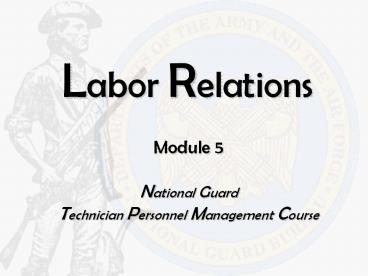Labor Relations - PowerPoint PPT Presentation
1 / 17
Title:
Labor Relations
Description:
Labor Relations Module 5 National Guard Technician Personnel Management Course BARGAINING UNIT EXCLUSIONS 5 USC 7112(b) Supervisory/Management Officials Personnelists ... – PowerPoint PPT presentation
Number of Views:133
Avg rating:3.0/5.0
Title: Labor Relations
1
Labor Relations
- Module 5
- National Guard
- Technician Personnel Management Course
2
BARGAINING UNIT EXCLUSIONS5 USC 7112(b)
- Supervisory/Management Officials
- Personnelists (non-clerical)
- Assistants to general labor relations policy
officials - Employees engaged in work affecting national
security - Employees who perform agency investigative or
audit activities - Professional employees in a mixed pro/non-pro unit
3
DEFINITION OF A SUPERVISOR5 USC 7103
- A supervisor is a person who is authorized, with
respect to employees, to do or recommend at least
one of the following - -hire -promote -direct employees
- -transfer -furlough -suspend
- -assign -remove -reward
- -recall -lay-off -adjust grievances
- -discipline
4
DUTY TO BARGAIN
- Personnel Policies
- Merit Promotion/Hiring Reduction In Force
(RIF)/Furlough Procedures - Personnel Practices Working Conditions
- Parking assignments picnics employee lockers
location of coffee makers and microwave ovens
office space/design type and placement of office
furniture, etc
5
NON-NEGOTIABLE MANAGEMENT RIGHTS5 USC 7106(a)
- Determine mission, budget, organization, employee
numbers and internal security - Hire, direct, lay-off and retain employees
- Suspend, remove, reduce (grade/pay) or discipline
employees
6
NON-NEGOTIABLE MANAGEMENT RIGHTS5 USC 7106(a)
- Assign work, contract out and determine which
personnel will perform operations - Select and appoint employees
- Take necessary emergency actions
7
MANAGEMENTUNFAIR LABOR PRACTICESunder 5 USC
7116(a)
- Interference, restraint or coercion of an
employee in the exercise of assured rights - Encourage or discourage membership in a labor
organization by discrimination with respect to
conditions of employment - Sponsor, control or otherwise assist a labor
organization
8
MANAGEMENTUNFAIR LABOR PRACTICESunder 5 USC
7116(a)
- Discipline or discriminate against an employee
because the employee has filed a complaint or
given testimony under 5 USC 7116 - Refuse to consult/negotiate
- Fail to cooperate in impasse procedures
- Enforce rules or regulations in conflict with a
prior collective bargaining agreement
9
WHAT IS A FORMAL DISCUSSION?Under 5 USC
7114(2)(A)
- A discussion which is
- formal in nature,
- between one or more representatives of the agency
AND one or more bargaining unit employees or
representative, AND - related to any grievance or any personnel policy
or practices or other general conditions of
employment
10
MANAGEMENT OBLIGATIONS5 USC 7117(d)(2)
- Notify the appropriate union representative of
the meeting - Afford union the opportunity to select its
representative and to attend - Allow the union representative to actively
participate at the meeting
11
THERE IS NO FORMAL DISCUSSION WHEN/IF
- Discussion is about and with an individual
employee related to his/her - Personal problems
- Job performance
- Performance evaluation
- Oral reply to proposed disciplinary action(s)
- During impromptu meetings on the shop floor
12
UNION RIGHTS WHEN GRANTED EXCLUSIVE
RECOGNITION5 USC 7114
Investigating Interviews THE WEINGARTEN
RIGHT (5 USC 7114(a)(2)(B)
13
UNION RIGHTS WHEN GRANTED EXCLUSIVE RECOGNITION5
USC 7114
- May negotiate agreements for all employees in the
collective bargaining unit - Responsible for representing the interests of all
bargaining unit employees member or NOT - Must be given the opportunity to be represented
at all formal management-employee discussion
concerning grievances or other negotiable issues
14
UNION RIGHTS WHEN GRANTED EXCLUSIVE RECOGNITION5
USC 7114
- Must be given the opportunity to be present at
any investigative examination of a unit employee,
IF the employee - Reasonably believes the examination may result in
disciplinary action, - AND
- Requests representation
15
USE OF OFFICIAL TIME5 USC 7131
- Internal union business shall be conducted
- during the non-duty hours of the employees
- concerned.
- MUST approve for Collective Bargaining
- FLRA Proceedings
- MAY approve for Other representational
activities - MAY NOT approve for Internal union
business
16
PAST PRACTICE5 USC 7117
- Once the parties establish a practice it becomes
a condition of employment and must be bargained - You do not have to bargain over the decision to
change a practice which conflicts with law or a
government-wide regulations - Management is not free of the obligation to
provide the union with advance notice of its
intent to change what has been a condition of
employment - Management must also bargain on demand on
bargain- able proposals which come back
17
Questions































